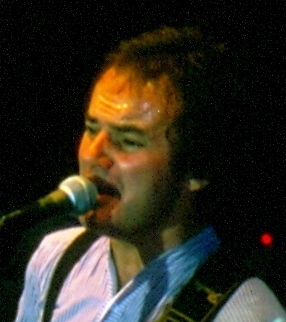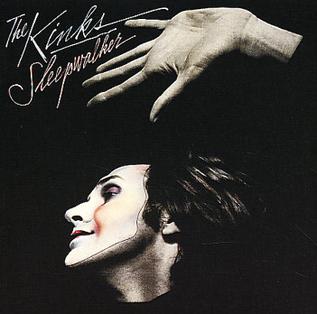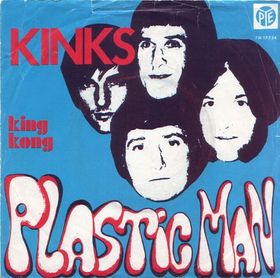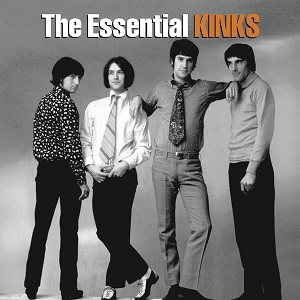
Face to Face is the fourth studio album by the English rock band the Kinks, released on 28 October 1966. The album marked a shift from the hard-driving style of beat music that had catapulted the group to international acclaim in 1964, instead drawing heavily from baroque pop and music hall. It is their first album consisting entirely of Ray Davies compositions, and has also been regarded by critics as one of rock's first concept albums. Davies' blossoming songwriting style became increasingly observational and satirical, commenting on English culture, social class and the music industry.

Arthur or the Decline and Fall of the British Empire, often referred to simply as Arthur, is the seventh studio album by the English rock band the Kinks, released on 10 October 1969. It was the first Kinks album to feature bassist John Dalton, who replaced Pete Quaife. Kinks frontman Ray Davies constructed the concept album as the soundtrack to a Granada Television play and developed the storyline with novelist Julian Mitchell; the television programme was never produced. The rough plot revolved around Arthur Morgan, a carpet-layer, who was based on Ray and guitarist Dave Davies' brother-in-law Arthur Anning. A stereo version was released internationally with a mono version being released in the UK, but not in the US.

Peter Alexander Greenlaw Quaife was an English musician, artist and author. He was a founding member and the original bassist for the Kinks, from 1963 until 1969. He also sang backing vocals on some of their records.

Michael Charles Avory is an English musician, best known as the longtime drummer and percussionist for the English rock band the Kinks. He joined them shortly after their formation in 1964 and remained with them until 1984, when he left amid creative friction with guitarist Dave Davies. He is the longest-serving member of the band, apart from the Davies brothers. He is also the most prolific member, again apart from the Davies brothers, who has played on twenty studio albums or nearly all of the band's creative output.

James Walter Rodford was an English musician, who played bass for several British rock bands. He was a founding member of Argent, which was led by his cousin Rod Argent, and performed with them from their formation in 1969 until they disbanded in 1976. He was the bassist for the Kinks from 1978 until they disbanded in 1997. In 2004, he joined the reunited Zombies, whom he had been closely associated with since the early 1960s, and remained a member until his death in 2018. He was also a member of the Swinging Blue Jeans and the Kast Off Kinks.
The Creation are an English rock band, formed in 1966. Their best-known songs are "Making Time", which was one of the first rock songs to feature a guitar played with a bow, and "Painter Man", which made the top 40 on the UK Singles Chart in late 1966, and reached No. 8 on the German chart in April 1967. It was covered by Boney M in 1979, and reached the No. 10 position on the UK chart. "Making Time" was used in the film Rushmore, and as the theme song from season 2 onwards of The Great Pottery Throw Down.

The Kinks were an English rock band formed in London in 1963 by brothers Ray and Dave Davies. They are regarded as one of the most influential rock bands of the 1960s. The band emerged during the height of British rhythm and blues and Merseybeat, and were briefly part of the British Invasion of the United States until their touring ban in 1965. Their third single, the Ray Davies-penned "You Really Got Me", became an international hit, topping the charts in the United Kingdom and reaching the Top 10 in the United States.

"Shangri-La" is a song written by Ray Davies of the Kinks. The song appeared on the 1969 concept album, Arthur. The song's inspiration can be traced back to when the band visited the Davies brothers' sister, Rose, and her family in Australia, the "designed community" that the family lived in serving as the initial lyrical inspiration. The song's highly ironic lyrics comment on British class society while portraying Arthur, the album's ill-fated protagonist, and his empty life in the suburbs. The musical aspects of the song both reflect and comment on the mood of the lyrics.

Low Budget is the eighteenth studio album by English rock group the Kinks, released in 1979. It was their first to feature bassist Jim Rodford who would remain with the group until their disbandment in 1996. Following the minor success of their 1978 album Misfits, the band recorded the majority of the album in New York rather than London. Unlike the more nostalgic themes of many Kinks albums prior to Low Budget, many of the album's songs allude to contemporaneous events. Musically, the album is a continuation of the band's "arena rock" phase, resulting in a more rock-based sound and more modern production techniques.

Misfits is the seventeenth studio album by the English rock band the Kinks, released in 1978. Following the minor success of Sleepwalker in the United States, Misfits featured a more rock-oriented style than many other Kinks records of the 1970s. It was their last album to feature pianist John Gosling and the only one to feature bassist Andy Pyle as a member, both of whom quit the band following internal conflicts. Despite this, the album made the Top 40 in America. The album also contained the minor hit single "A Rock 'n' Roll Fantasy", as well as less successful releases "Live Life" and "Black Messiah".

Percy is a 1971 film soundtrack for the British comedy film Percy performed by the English rock group the Kinks with additional orchestral arrangements conducted by Stanley Myers. It was released as the band’s ninth official studio album. The songs were written by Ray Davies and include both standard rock/pop songs and instrumental numbers.

Sleepwalker is the sixteenth studio album by the English rock group, the Kinks, released in 1977. It marked a return to straight-ahead, self-contained rock songs after several years of concept albums. It is the first album in what critics usually call the "arena rock" phase of the group, in which more commercial and mainstream production techniques would be employed. The album also marks the last appearance of bassist John Dalton, who left the band during the recording sessions. Dalton plays bass on all songs on the album save for "Mr. Big Man". The lineup of the Kinks would be trimmed down significantly in 1977 following the album's release, as the brass section and backup singers were removed and the band returned to a standard rock band outfit.

"Dead End Street" is a song by the British band the Kinks from 1966, written by main songwriter Ray Davies. Like many other songs written by Davies, it is to some degree influenced by British Music Hall. The bass playing was partly inspired by the "twangy" sound of Duane Eddy's guitar. It was originally released as a non-album single, but has since been included as one of several bonus tracks from the Face to Face CD. The song, like many others by the group, deals with the poverty and misery found in the lower classes of English society.
"Big Black Smoke" is the B-side to The Kinks' single "Dead End Street", written by Ray Davies. The song was not originally included on any album, but has since appeared as a track on the popular 1972 Kink Kronikles compilation and as a bonus track on the CD reissue of Face to Face.

"Plastic Man" is a song written by Ray Davies and recorded by the Kinks in 1969.

"Picture Book" is a song by the English rock band the Kinks from their 1968 album The Kinks Are the Village Green Preservation Society. Written and sung by Ray Davies, the song's lyrics describe the experience of an ageing narrator flipping through a photo album reflecting on happy memories from "a long time ago". Recorded in May 1968, its cheerful sound is defined by the jangle of an acoustic twelve-string guitar and a disengaged snare drum. In continental Europe, the song was issued as the B-side of the album's lead single, "Starstruck", in November 1968. The same single was issued in the United States in January 1969, though it failed to appear in any charts.

"Berkeley Mews" is a song by the English rock band the Kinks. It was released on a non-album single in June 1970, as the B-side to "Lola". Written and sung by bandleader Ray Davies, the song was recorded in early 1968 during the sessions for The Kinks Are the Village Green Preservation Society (1968). The title references a small street in London, while the lyrics recount a one-night stand. Influenced by the music of the 1940s, the song employs a heavier production than was typical for the band's 1968 work.

John "The Baptist" Gosling was a British keyboardist, pianist and vocalist, best known for being a member of the rock band The Kinks from 1970 to 1978, and was later a member of The Kast Off Kinks, a spin-off band composed of former members.

The Essential Kinks is a two disc compilation album by English rock band the Kinks, released on October 14, 2014, on Legacy Records, a division of Sony Music Entertainment.
















